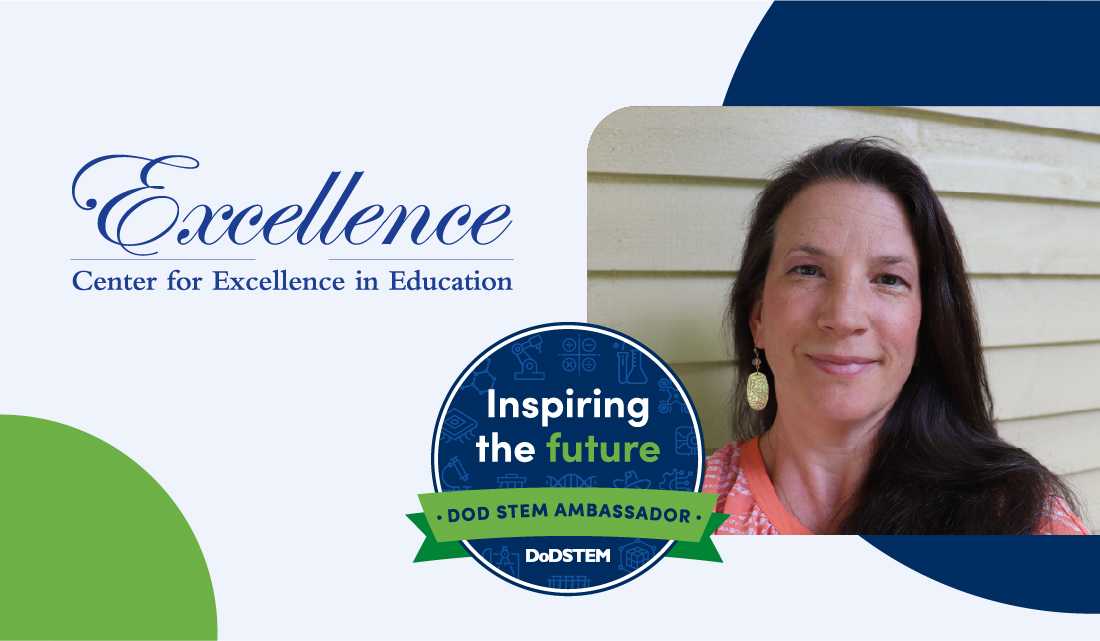Mentoring Students in Authentic Research
09 Jan 2023
Heather Overkamp, a DoD STEM Ambassador, shares practical tips to support student research projects
Have you ever wanted your students to conduct research but weren't sure where to start? Mentoring students can be overwhelming. This guide will help you turn chaos into success! Read on for information about getting projects funded, finding and coordinating mentors, managing deadlines and making travel arrangements to science competitions.

The following was written by Heather Overkamp, a high school STEM teacher and DoD STEM Ambassador. DoD STEM Ambassadors work with the Defense STEM Education Consortium (DSEC) to advance STEM outreach for students who are underrepresented in STEM and/or military connected. Overkamp was selected by the Center for Excellence in Education, a DSEC partner, as their DoD STEM ambassador for the 2021-2022 school year.
Student research is a powerful learning tool with long-term benefits. If you already teach a class with time and space for student projects, you’re one step closer to facilitating student learning through research. Student researchers learn content and research skills as well as important soft skills such as collaboration, critical thinking, problem-solving and communication, through writing and presenting. If your school does not offer a course for student researchers, check out your state’s course guide. Keep in mind that it may not be in the sciences but rather in the humanities, literature, career and technical education or even an Advanced Placement course. Finding the right course and convincing your director of counseling and principal it’s worth the teacher salary is the first hurdle. To prepare for success, go in with a plan that includes a list of student benefits, your funding ideas (if necessary) and how mentoring students builds collaboration between departments and the whole school.
Project funding can be a hurdle, but it doesn’t have to be if you know where to look. Find out how much money may be available for your department or through special programs within your district. Sometimes, all it takes is talking to the right people to learn about government funding. If local funds are not available, start searching online. Many businesses, nonprofit organizations and government entities are required to designate a portion of their budget to education outreach. Evaluate the grant application process: is it a lengthy process for $500 or is there a simple online form that can be filled out easily for several thousand? Your time is valuable and a quick benefit-to-risk analysis will help you stay focused on what is important.
A solid mentor can be the most important factor in helping students successfully complete a quality research project. Mentors do not have to be highly sought-after professors at “Big U.” Junior professors, university employees or graduate students are excellent candidates if they commit to spending regular, quality time with your students. I recommend that students do some digging online to find people at businesses or universities whose professions align with their project topic, craft some questions and get permission to contact them. It may take follow-up calls and/or emails from you to coordinate meeting times, places and people. It is helpful to keep each student’s information accessible in a shared document or spreadsheet.
Google apps have been the most helpful coordination tools. Spreadsheets allow me to keep track of student projects, mentors, deadlines and paperwork. Once the competition dates are set and I know how much funding we have, I can make decisions about which competitions are realistic (based on costs, time away from school and gain), and with the use of Google Sheets and my smartphone calendar, I can keep track of everything digitally. These tools also make it easy to share information with co-teachers, parents and students and give feedback to students through comments and suggestions.
Planning as much as possible ahead of time will help students run their projects more smoothly. Google apps have helped me do this by putting more of the burden on students (such as with mentors, research and experiment planning). When you have more than 12 students completing individual projects, it is essential that they are responsible for their own project and are aware of how the various steps of the process will be evaluated via rubrics.
The last hurdle is coordinating and traveling to competitions. Some have become permanently virtual while others are returning as in-person events. Know how much each is going to cost and coordinate with your funding source to ensure transportation, gas, lodging, meals and entry fees can be covered. Keeping a spreadsheet of the competitions, deadlines, fees, formats, locations and dates is highly recommended as it can be easy to let any of these slip by and may result in students not being able to participate in one or several competitions.
I hope this information encourages you to start simple. Start small, but just start! The benefits of student research are priceless. And who knows, students of all ages may find their passion that leads to a career in a STEM field.
About DoD STEM and Defense STEM Education Consortium
Defense STEM Education Consortium (DSEC) is a collaborative partnership of STEM-focused organizations dedicated to addressing and prioritizing our nation's STEM talent. DSEC aims to broaden STEM literacy and develop a diverse and agile workforce with the technical excellence to defend our nation. Through strategic investment in STEM education and outreach activities, the effort will provide students with more exposure to educational and career opportunities as well as DoD research. DSEC is led on behalf of DoD STEM by RTI International.
About Center for Excellence in Education
The Center for Excellence in Education’s (CEE) mission is to nurture the development of gifted and talented high school and university students in the STEM disciplines. All its programs are offered cost free to students who are selected competitively to attend. CEE sponsors three programs: Research Science Institute, USA Biolympiad, and Teacher Enrichment Program. CEE’s role in DSEC is to foster internship opportunities at DoD labs for Research Science Institute alumni.